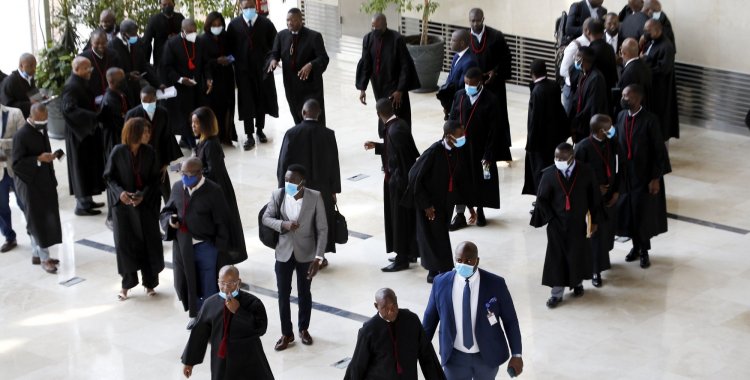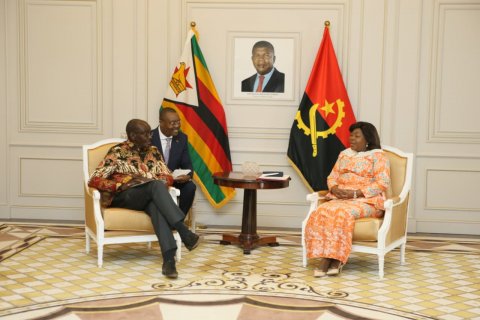According to Manuel Correia, former commander of the Cuando-Cubango Road Transport and Demining Battalion, attached to the Military House of the President of the Republic, the amount was the remainder of the salary of the staff of that military unit.
Eusébio de Brito Teixeira, a retired general in the Angolan Armed Forces (FAA), was, at the time of the events, commander of the military region of Cuando-Cubango, coordinator of the aforementioned battalion and years later governor of Cuando-Cubango, in the south of the country.
Listed as a witness by the defense of co-defendant Manuel Correia, General Eusébio was questioned this Tuesday, at the courthouse, and denied having been the beneficiary of bags of money, which allegedly remained after the payment of the salaries of the staff of the battalion.
Manuel Correia, one of the 49 defendants in this mega case, said on 2 September, during his interrogation, that he had "several times" delivered suitcases of money, with around 25 million to Generals Eusébio de Brito and António Mateus Júnior de Carvalho "Dilangue".
This Tuesday, Eusébio de Brito denied the accusations and said that all the logistics, administrative and financial issues of the Cuando-Cubango battalion were the responsibility of its commander, Manuel Correia.
The witness said that in the guise of commander of the military region of Cuando-Cubango and of battalion coordinator, he only approved the unit's salary sheets and that he did not know where they were prepared.
He stated that he did not have the competence to insert employees in that unit, having admitted, however, that at the stage in which the aforementioned sheets were approved, with his stamp, there were occasions when he realized that the battalion was admitting personnel.
The prosecution of the Public Ministry (MP) mentions that several civilians, among employees of the Bank of Savings and Credit (BPC), employees of the government of Cuando-Cubango and even "ghost employees" were included in the battalion's payroll.
The FAA general, with a history of working in Cuando-Cubango between 2003 and 2018, also made it known that he stopped homologating the unit's salary sheets when he realized the "strange" increase in personnel in the battalion, which he did not get any explanation of your commander.
Even after he had failed to ratify his salary slips, he explained, those responsible for the unit "falsified" his signature using a 'scanner' and sent them to Luanda, an act he considered "criminal".
Eusébio de Brito revealed that his daughter's name had been entered on the Cuando-Cubango battalion's payroll, in a process that he said he did not know, and that the unit's commander only removed her name under pressure from him.
Faced with the divergent arguments between the statements of Eusébio de Brito and Manuel Correia, the defense of the co-defendant asked the court to confront them, limited to only four questions, and the judge in the case and the MP did not oppose.
During the confrontation, Colonel Manuel Correia reaffirmed that he delivered monthly bags of money from the remaining salary of his staff to General Eusébio's residences, namely in the provinces of Luanda, Cuando-Cubango and Cuanza Sul, the latter where the witness was also governor.
According to Manuel Correia, there were occasions when he would deliver the bags of money to the general's driver, in his absence.
In this confrontation, Manuel Correia also admitted that Eusébio de Brito's name (signature) was "scanned", sometimes, when he failed to homologate his staff's salary sheets.
In response to Colonel Manuel Correia's arguments, during the course of the confrontation, General Eusébio de Brito denied the accusations and assured that he never benefited from the alleged bags of money.
At the end of his inquisition, in statements to journalists, Eusébio de Brito again refuted the accusations, guaranteeing that, in court, he told "only the truth" and that he is "quiet".
"What goes into my soul was to have said what is the truth, what it was up to me to say in terms of the questions that were asked of me, accusations of something I didn't do and, therefore, I had to say the truths here. First I was accused that I was receiving money, but I was not receiving money", he stressed when questioned by Lusa.
The former deputy of the Popular Movement for the Liberation of Angola (MPLA) also regretted that his signature had been "falsified, so that the salary sheets would be sent to the Military House of the President of the Republic".
"And Colonel Correia ended up confirming that the [salary] sheets were not made by him, but that they 'scanned' my name and that it even constitutes a crime", he highlighted.
He also said that he did not know the reason for the accusations: "I also don't know [the reasons for the accusations], but I answered what I had to answer and he [Manuel Correia] also confessed and justified that they falsified the sheets in my name", he said.
The 'Lussati case', in which 49 defendants are involved, has as its visible face Major Pedro Lussati, assigned to the Military House of the Presidency of the Republic, considered the leader of the group, who was arrested in possession of millions of dollars, euros and kwanzas. stored in suitcases, crates and in several vehicles.
At the instance of Pedro Lussati's defense, General Eusébio de Brito said that he did not know the major and that he only met him on television when the case arose.
The defendants, including FAA officials and civilians, are indicted for crimes of embezzlement, criminal association, undue receipt of advantage, economic participation in business, abuse of power, fraud in the transport or transfer of currency abroad and others.







